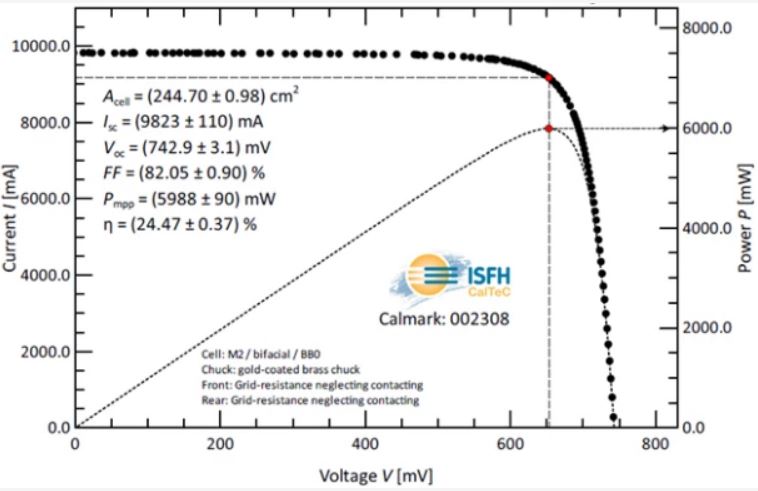Researchers at France's National Solar Energy Institute (INES) – an arm of the French Alternative Energies and Atomic Energy Commission (CEA) – and Italian renewable energy company and heterojunction solar module manufacturer Enel Green Power claim to have achieved a power conversion efficiency of 24.47% for a gallium-doped p-type heterojunction silicon solar cell.
The result was certified by the Institute for Solar Energy Research Hamelin (ISFH) in Germany. “It was achieved using the same manufacturing processes as the N-type, demonstrating once again the versatility and robustness of this technology,” the CEA said in a statement.
“A new way of manufacturing P-type Cz wafers has recently been deployed on a large scale by replacing boron doping with gallium (Ga) doping at no extra cost, making them insensitive to degradation phenomena under light,” according to the statement. “A recent study indicates that P-type heterojunction cells should have an efficiency gap of less than 0.4% absolute to be competitive with N-type heterojunctions.”
The solar cell also showed an open-circuit voltage of 749.2mV, a short-circuit current of 9823mA, and a fill factor of 82.05%.
The wafer technology for the device was provided by Chinese manufacturer Longi.
Enel Green Power and the CEA achieved in August 2020 an efficiency of 25.0% for a heterojunction solar cell with an active surface of 213 cm2, based on a M2 silicon wafer format. With this result, the two parties had improved upon their previous record of 24.63%, reached last February. Enel said at the time the increase in efficiency was made possible by combining busbarless technology – which enables more light to fall onto the cell surface – and a treatment developed by INES and Enel which further improved cell passivation
This content is protected by copyright and may not be reused. If you want to cooperate with us and would like to reuse some of our content, please contact: editors@pv-magazine.com.




2 comments
By submitting this form you agree to pv magazine using your data for the purposes of publishing your comment.
Your personal data will only be disclosed or otherwise transmitted to third parties for the purposes of spam filtering or if this is necessary for technical maintenance of the website. Any other transfer to third parties will not take place unless this is justified on the basis of applicable data protection regulations or if pv magazine is legally obliged to do so.
You may revoke this consent at any time with effect for the future, in which case your personal data will be deleted immediately. Otherwise, your data will be deleted if pv magazine has processed your request or the purpose of data storage is fulfilled.
Further information on data privacy can be found in our Data Protection Policy.